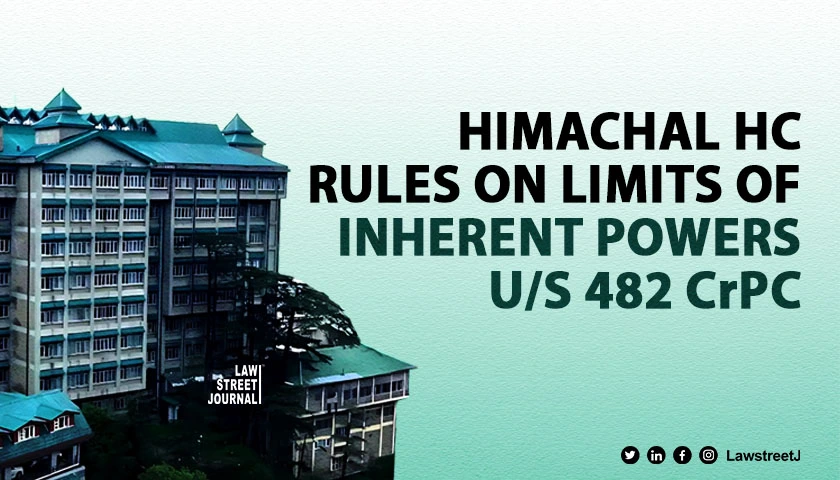Himachal Pradesh: The Himachal Pradesh High Court has delivered a significant ruling on the scope of inherent powers under Section 482 of the Criminal Procedure Code (Cr.P.C.), emphasizing that these powers cannot be invoked when an alternative remedy is available.
Justice Rakesh Kainthla heard a petition filed by Mohan Singh and others seeking the quashing of an FIR registered for offences under Sections 323, 504, and 506, read with Section 34 of the Indian Penal Code.
The court noted that all the offences mentioned in the FIR are compoundable under Section 320(1) of the Cr.P.C. without the intervention of the court. Dismissing the petition, Justice Kainthla observed:
“Since the offences fall under Section 320(1) of the Cr.P.C., the permission of the Court is also not required, and it cannot be said that the Court is not likely to grant permission justifying the filing of the present petition. Thus, there exists no reason to exercise the extraordinary power vested in this Court under Section 482 of the Cr.P.C. when an alternative remedy is available.”
The court emphasized that inherent powers under Section 482 Cr.P.C. should be exercised sparingly and not when specific remedies are provided in the Code. Citing several Supreme Court judgments, Justice Kainthla noted:
“It is a well-established principle that the inherent power conferred on the High Courts under Section 482 Cr.P.C. has to be exercised sparingly, with circumspection, and in rare cases, and that too to correct patent illegalities or when a miscarriage of justice has occurred.”
In conclusion, while dismissing the petition, the court noted that this order would not prevent the parties from approaching the trial court to seek composition of the offences. It also clarified that the power under Section 482 Cr.P.C. should not be resorted to if there is a specific provision in the Code for the redress of grievances, and it should be exercised very sparingly to prevent abuse of process or to secure the ends of justice.



![Himachal HC Grants Bail to Man Accused of Unnatural Acts with Cow [READ ORDER]](/secure/uploads/2020/11/lj_8855_Himachal_Pradesh_High_Court.jpeg)
![Remaining in India after expiry of visa is offence, Himachal Pradesh HC reiterates while denying bail [Read Petition]](/secure/uploads/2023/12/lj_3841_e40384f4-2611-4a51-b179-97824c5e53c7.jpg)

![Supreme Court Stays Himachal Pradesh HC Order, Sanjay Kundu to Remain as State DGP Amid Businessman's Complaint [Read Order]](/secure/uploads/2024/01/lj_5499_5a926c6d-aa3b-4344-b54d-2c7fc5145ace.jpg)




